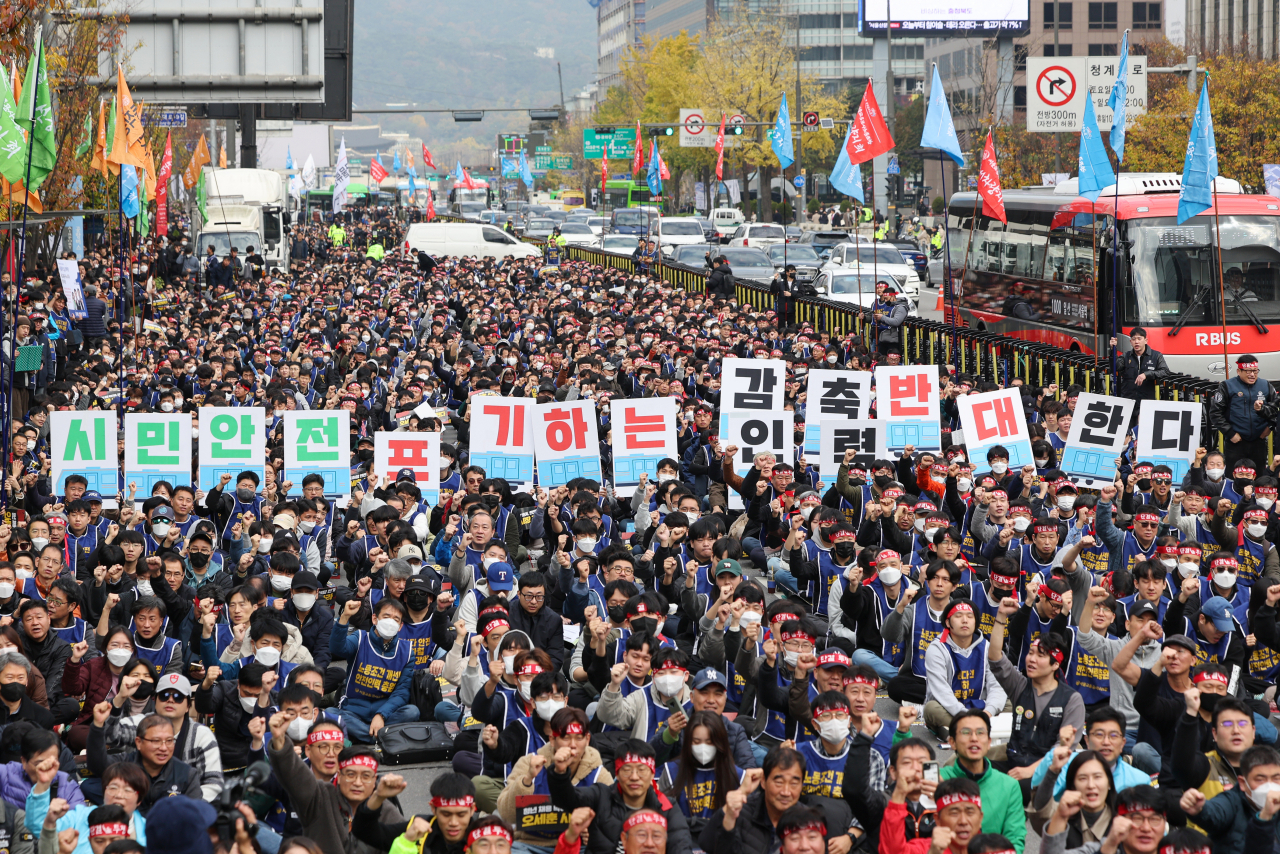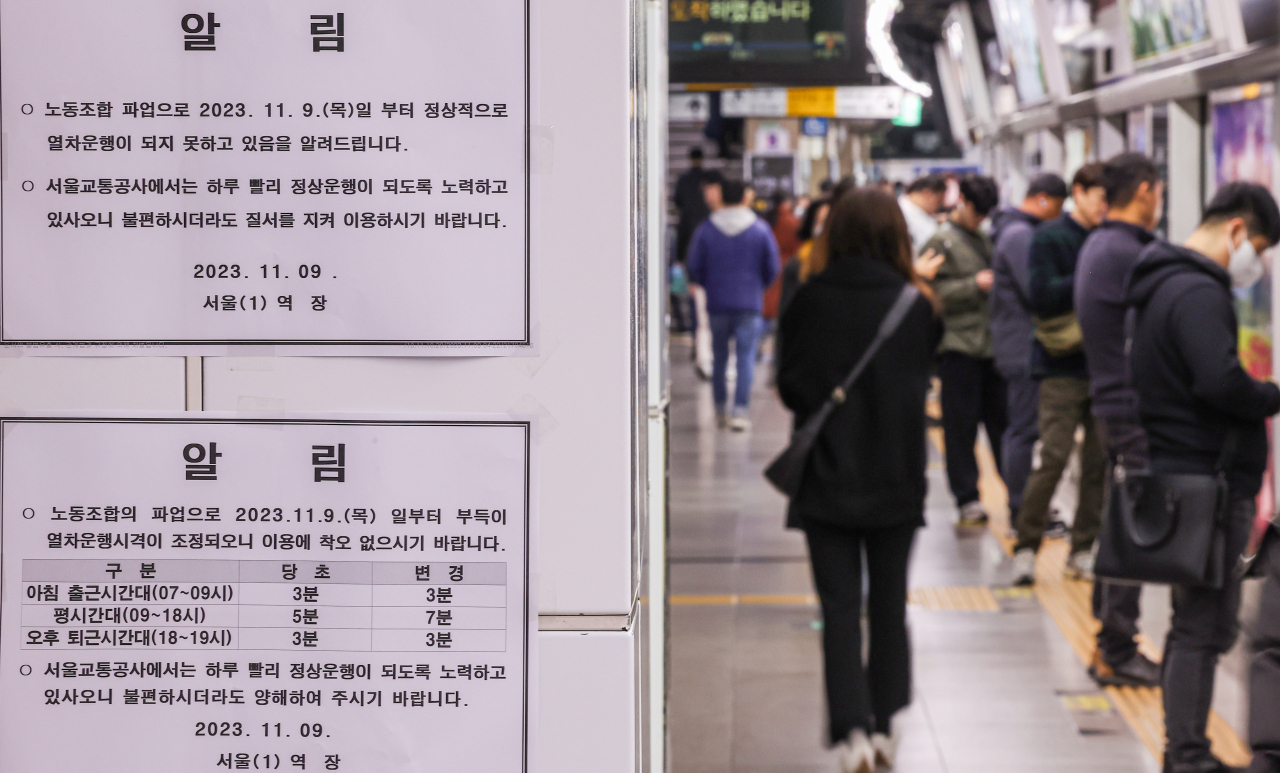Unionized Seoul Metro workers launch 2-day strike
Downsizing plan, outsourcing of safety personnel threatens riders' safety, the union says
By Lee Jung-younPublished : Nov. 9, 2023 - 15:30

As the Seoul Metro, operator of the city's subway system, initiated a two-day warning strike Thursday to protest the company's downsizing plans, disruptions are expected outside of rush hour.
The labor union of the Seoul Metro is holding a strike from 9 a.m. on Thursday to 6 p.m. Friday as the final negotiations broke down the previous day. Seoul Metro operates Seoul subway lines 1 to 8 and some sections of line 9.
During rush hour, from 7 a.m. to 9 a.m., all subway trains will operate as usual according to the agreement that the union and company made prior to the strike, but after those hours, there will be fewer trains. The Seoul Metropolitan Government and the Seoul Metro expect the subway to operate at 82 percent during the strike.
This year is the second year in a row that the union has gone on strike, following last year. Unlike last year, when a full-scale strike was launched, this week's two-day temporary strike is a warning, and there is still a possibility of a longer, bigger strike.
The union held final negotiations at 3 p.m. Wednesday, demanding a withdrawal of the labor force reduction plan and safety workers outsourcing plan proposed by the company. The meeting was suspended just two minutes after it started, and it was resumed around 5 p.m. After a confrontation that lasted hours, both parties declared a breakdown in the negotiations at 9:13 p.m.
In order to resolve a large-scale deficit, the Seoul Metro had come up with a plan to lay off 2,212 employees, or 13.5 percent of its total labor force by 2026.
The labor union has protested, but management has insisted on cutting the workforce, saying that 383 people must be let go this year as planned and that further personnel reductions would be discussed later. The union proposed hiring enough staff to at least replace the 276 workers who are to retire this year, urging the company that it will be essential to fill the vacuum in on-site safety workers. But the final negotiations broke down as the management refused.
Meanwhile, union members from the relatively moderate Federation of Korean Trade Unions did not participate in the strike, although they took part in the negotiations. The members who are part of the more activist Korean Confederation of Trade Unions umbrella union went on a strike. There were disagreements between the two unions during the negotiation process.
The labor unions of the Seoul Metro are largely divided into the Korean Public Service and Transport Workers' Union, which is under the KCTU, and the Federation of Korean Public Trade Unions under the FKTU. The former has substantially more union members by about 10,000, while the latter has about 2,800 members. Members from the smallest union, called Allbaleun Union, also did not participate in the strike.

"We didn't come here for a wage increase. The safety of the people and subways will be threatened by the reduction of the workforce and outsourcing of safety work," said Myung Soon-pil, chairman of the Korean Public Service and Transport Workers' Union, at a strike declaration ceremony held near Seoul City Hall Thursday morning.
"Following the plan of the Seoul Metro, a vacuum in on-site safety personnel will be inevitable from January next year. Given that the recruitment process takes four to five months, we should hurry up with the recruitment right now," said Myung.
Meanwhile, Labor Minister Lee Jung-sik called for an end to the strike on social media, Thursday. Arguing that Seoul Metro's cumulative deficit has reached 17.68 trillion won ($13.48 billion) as of last year, Lee said, "I deeply regret that the union is for going on strike even though it is a time for both labor and management to devote themselves to self-rescue efforts."
Saying that the Seoul Metro workers have responsibility to provide essential public services, Lee urged workers to return to work. He also referred to the recent increase in subway fares by 150 won, claiming that the union is being irresponsible while the people have already shared some of the burden.




















